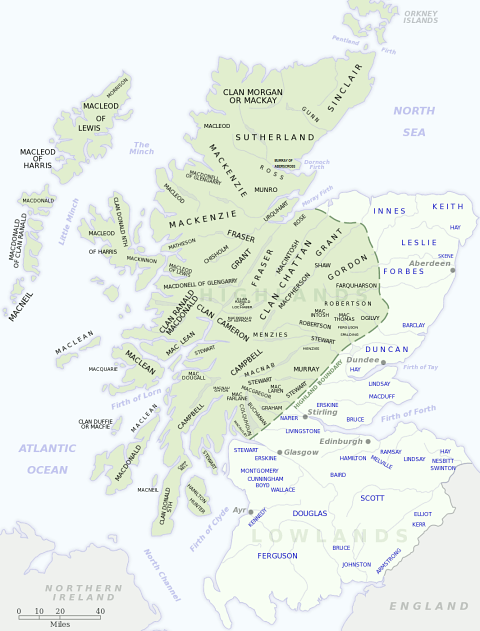
Motto: Per mare per terras (By sea and by land)
Historic Seat: Finlaggan Castle
District: Hebrides, Ross-shire
Associated Surnames: Alexander, Allan, Allanson, Balloch, Beath, Begg, Bowie, Burk, Colson, Coull, Coulson, Crombie, Crum, Daniels, Donaldson, Donillson, Donnellson, Galt, Gilbride, Gill, Gorrie, Gowan, Gowrie, Hawthorn, Hewitson, Hewitt, Howison, Hudson, Hughson, Hutchenson, Hutcheson, Hutchinson, Hutchison, Isles, Jeffrey, Kean, Keene, Kellie, Kinnell, Leitch, MacA'challies, MacAllan, MacBeath, MacBeth, MacBheath, MacBride, MacBurie, MacCaishe, MacCall, MacCash, MacCaul, MacCeallaich, MacCluskie, MacCodrum, MacColl, MacConnell, MacCoish, MacCook, MacCosram, MacCrain, MacCrindle, MacCririe, MacCruithein, MacCuag, MacCuish, MacCutchen, MacCutcheon, MacDaniel, MacDrain, MacEachern, MacElfrish, MacElheran, MacGill, MacGillvantic, MacGilp, MacGorrie, MacGoun, MacGowan, MacHendry, MacHugh, MacHutchen, MacIan, MacIlreach, MacIlrevie, MacIlvride, MacIlwraith, MacIssac, MacKeachean, MacKean, MacKellachie, MacKelloch, MacKiggan, MacKillop, MacKinnell, MacLairish, MacLardie, MacLarty, MacLaverty, MacO'Shannaig, MacPhillip, MacQuistan, MacRaith, MacCrory, Macrurie, MacShannachan, MacSorley, MacSporran, MacSwan, MacSween, MacVarish, MacWhannel, Mark, Martin, May, Murdoch, Murdoson, Murphy, O'Drain, Norie, Paton, Philipson, Pitullich, Purcell, Reoch, Revie, Ronald, Ronaldson, Sanderson, Shannon, Sorely, Sporran, Wheelan, Wilkie, Wilkinson
Associated Tartans:
Early MacDonald Genealogy and History:
(Excerpt from "The Scottish Clans and Their Tartans", James Grant, 1906)
Of all the clans, that of the MacDonald is by every rule of "antiquity, power, and numbers fully entitled to be spoken of before any other," says Robertson. "Their founder was named in Gaelic Somhairle, and by the Norsemen Somerled, both words having the same meaning, namely Samuel. This hero, for such he undoubtedly was, did more to free his countrymen from the rule of the Danes and Norwegians than any other, and in consequence attained to a power greater than has fallen to the lot of a subject of present Scotland. His origin, as stated by Gregory, seems to be clearly Pictish. His father's name was Gillebrede, a very common Pictish name." It signifies the followers of St Bride or Bridget.
Ronald MacDonald Glas of Keepoch fought at Blairleine1 in 1544, and was afterwards captured by Huntly, and warded as a traitor in the Castle of Ruthven, and was beheaded, together with Ewen, son of Allan, Captain of the Clan Cameron.
The Braelochaber MacDonalds were always called of Keppoch.
His chief, Ronald Oig of Keppoch, when the tide of battle had turned against the great Marquis had often to seek shelter in a cavern in Rannoch.
It was MacDonald of Keppoch who, proudly disdaining to hold by a sheepskin the lands of Glenroy, in 1687, asserted by the sword his right against MacIntosh, who had obtained a crown charter of the disputed territory, vanquished and took him prisoner in a desperate conflict, and compelled him to renounce his acquired claim. In requital for his temerity, Keppoch lands were laid waste with fire and sword by a body of Scottish Regulars from the Lowlands.
Keppoch's strength in 1715 was only 220 men. It was more than double this in 1745.
The three MacDonald Regiments of Glengarry, Keppoch, and Clanranald were on the left wing of the Prince's first line at Culloden2, but refused to advance in the headlong charge, on the plea that the right wing had ever been their post since Bannockburn3. When the rest of the line advanced, fruitlessly did the Duke of Perth wave his bonnet to them, and cry, "Claymore! Claymore!" hoping to stimulate them by his example. Keppoch, the venerable and fearless, advanced to the charge alone, or with a few kinsmen, while his clan, an event unknown in Highland history, remained stationary. "My God!" cried the old man, in the bitterness of his heart; "My God! have the children of my tribe forsaken me?"
Unmoved, they saw him fall, and after exchanging a few rounds with the Scots Royals and "34th" marched off the field with colours flying and pipes playing.
(End excerpt)
Next page: Clan MacDonald of Clanranald
Footnotes:
1 The Battle of Blairleine (Blar na Le´ine) (1544): The Battle of Blairleine was fought on 15 July 1544 was fought near Loch Lochy in Lochaber, Scotland and is a classic example of clan warfare in the Highlands. Read more about Blar na Le´ine at Historic Environment Scotland.
2 The Battle of Culloden (1746): The Battle of Culloden was fought on 16 April 1746, on Drummossie Moor, near Culloden, east of Inverness Scotland, between Scottish forces led by Charles Edward Stuart (Bonnie Prince Charlie) and English forces led by William Augustus, Duke of Cumberland. It was the final confrontation of the Jacobite rising of 1745. Read more about the Battle of Culloden at Wikipedia.
3 The Battle of Bannockburn (1314): The Battle of Bannockburn was fought on 23 and 24 June 1314, was a victory of the army of Robert the Bruce, King of Scots, over the army of King Edward II of England in the First War of Scottish Independence. Read more about the Battle of Bannockburn at Wikipedia.

Distribution of Scottish clans and families
View larger map at Wikimedia Commons

Browse the Clan MacDonald Tartan Collection with home decor, personal accessories, crafting, paper products, and more.

Browse the Argyll District Tartan Collection with clothing, home decor, accessories, electronics cases, and more.

Clan MacDonald Postcard: Digitally cleaned and enhanced vintage illustration with tartan border.